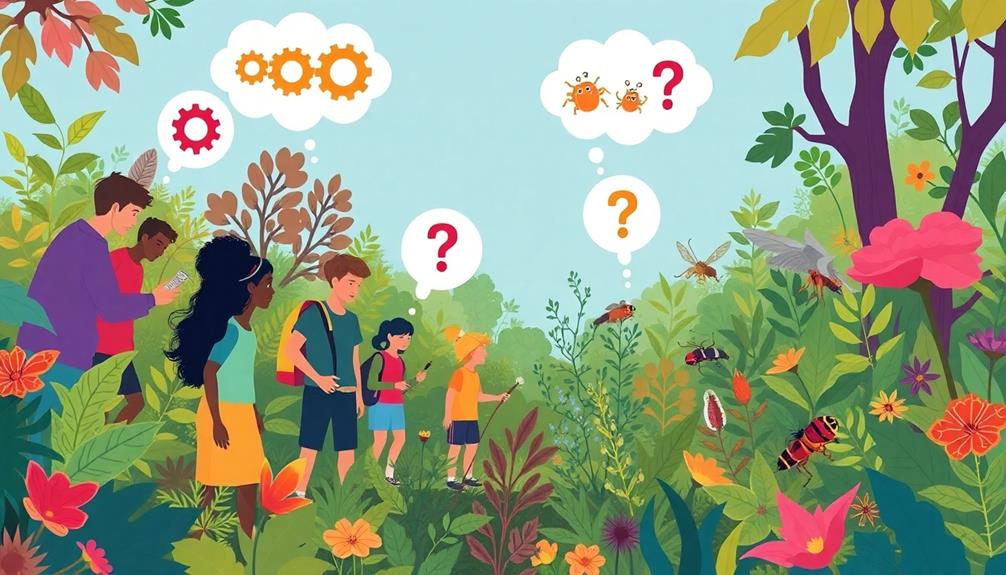Curiosity plays an essential role in enhancing your critical thinking skills. When you nurture your curiosity, you engage in deeper questioning and explore new ideas. This process helps you analyze, synthesize, and connect different pieces of information. By encouraging inquiry and challenging assumptions, curiosity acts as a debiasing tool, reducing cognitive biases that distort your thinking. It also promotes lifelong learning and innovative problem-solving. So, as you embrace a curious mindset, you're not just improving your critical thinking skills; you're also enriching your overall learning experience. You'll discover even more ways to enhance your thinking skills from here.
Key Takeaways
- Curiosity drives the questioning process, enhancing critical thinking by prompting deeper exploration and analysis of information.
- Engaging in inquiry-based learning fosters critical thinking skills by encouraging independent exploration and problem-solving.
- A curious mindset mitigates cognitive biases, allowing for more objective decision-making and diverse perspective evaluation.
- Open-ended questions, stimulated by curiosity, promote richer insights and enhance retention of knowledge through active engagement.
- Exposure to diverse viewpoints fosters creativity and innovation, enriching critical thinking abilities and enhancing collaborative problem-solving.
Understanding Curiosity
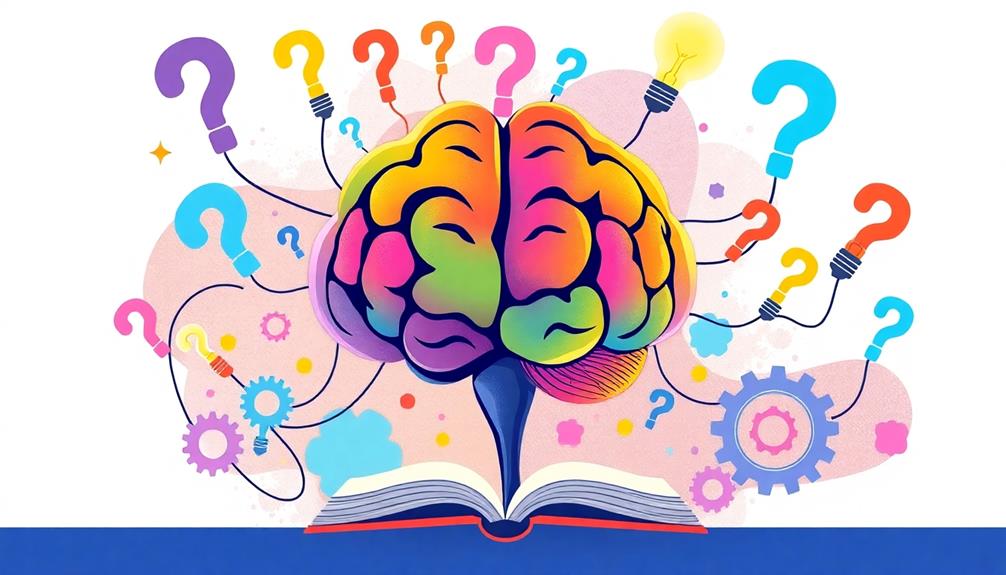
Curiosity is a fundamental trait that drives you to explore and learn about the world around you. It's that innate desire to ask questions and seek answers, which is essential for fostering critical thinking and problem-solving skills.
When you engage with topics that genuinely interest you, you considerably enhance your background knowledge. This deeper understanding makes it easier to analyze and synthesize information effectively.
Moreover, curiosity acts as a powerful debiasing tool, helping you recognize and mitigate cognitive biases that can hinder your ability to make objective decisions. Research shows that environments that promote curiosity lead to deeper engagement with material and better retention of knowledge.
You're more likely to pursue self-directed learning when you feel curious.
Cultivating curiosity also stimulates innovative thinking. It encourages you to explore beyond established beliefs and consider different perspectives.
This exploration is crucial for a thorough understanding of complex issues, allowing you to connect seemingly unrelated ideas. By nurturing your curiosity, you're not just satisfying a desire to know; you're actively enhancing your critical thinking skills, empowering you to tackle challenges with confidence and creativity.
Defining Critical Thinking
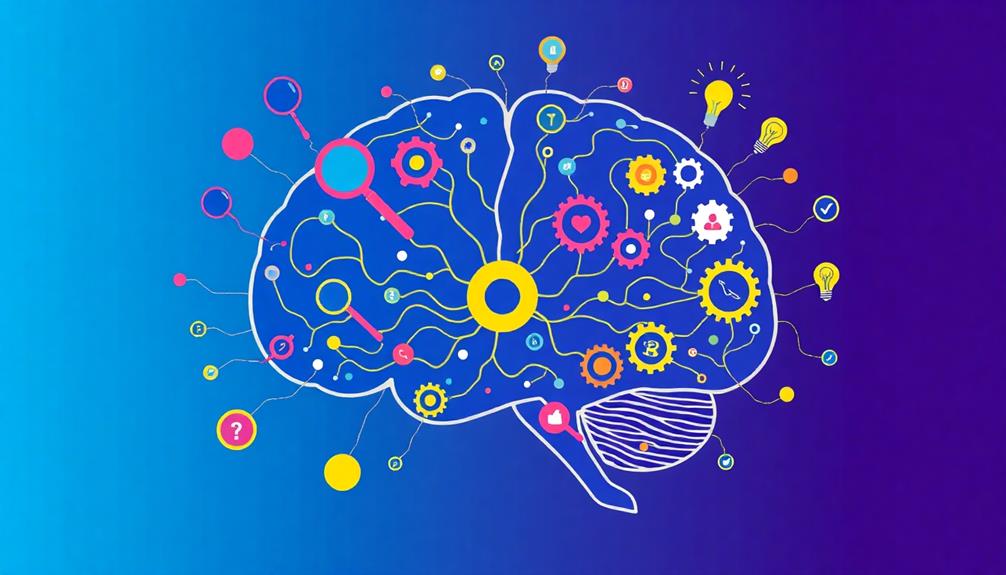
Critical thinking is about actively analyzing and evaluating information to make informed decisions.
You won't just memorize facts; you'll identify problems, investigate evidence, and develop your own hypotheses.
This process is essential for tackling complex questions and enhancing your overall understanding of the world.
Critical Thinking Defined
The essence of effective decision-making lies in understanding vital thinking, a skill that allows you to analyze facts and draw informed conclusions. Critical thinking is the process of evaluating information to make reasoned judgments and solve problems. It involves defining problems, investigating evidence, and formulating hypotheses—tasks that require time, effort, and motivation.
By fostering curiosity as a success tool, individuals can enhance their critical thinking abilities, as curiosity encourages deeper inquiry and exploration of diverse perspectives.
By developing your critical thinking skills, you enhance your ability to think critically about complex issues, leading to better academic performance and effective problem-solving. Engaged critical thinkers approach decisions with careful consideration of the information at hand, avoiding hasty conclusions that can lead to errors.
This lifelong skill benefits all areas of your life, fostering the analytical abilities necessary for personal and professional success. In a world overflowing with information, the capacity to analyze and question is essential.
You'll find that when you actively apply critical thinking, your decision-making improves, and you become more adept at maneuvering challenges. Ultimately, understanding critical thinking empowers you to approach situations thoughtfully, ensuring that your conclusions are well-founded and your actions are informed.
Importance of Inquiry
Inquiry sits at the heart of effective critical thinking, driving you to question assumptions and seek deeper understanding. It's a dynamic process that empowers you to analyze information, allowing you to make informed judgments. By engaging in inquiry, you're not just absorbing facts; you're actively exploring and evaluating them.
| Inquiry Process | Critical Thinking Outcome |
|---|---|
| Questioning Assumptions | Enhanced Analytical Skills |
| Gathering Evidence | Informed Decision Making |
| Defining Problems | Clearer Perspectives |
| Developing Hypotheses | Innovative Solutions |
| Encouraging Exploration | Deeper Understanding |
According to Barry Beyer, critical thinking involves evaluating facts, which emphasizes the need for inquiry in addressing complex issues. Research shows that students engaged in inquiry-based learning often achieve better academic performance, showcasing the vital role of inquiry in education. By nurturing a culture of inquiry, you cultivate an environment where questions are valued, leading to richer perspectives and more effective solutions. Ultimately, embracing inquiry is essential for honing your critical thinking skills and maneuvering the complexities of the world around you.
Components of Analysis
Understanding the components of analysis is crucial for developing effective critical thinking skills. When you engage in curiosity and critical thinking, you start by identifying problems clearly. This initial step sets the stage for deeper investigation.
Next, you gather and scrutinize evidence, ensuring your conclusions are grounded in reality. This process isn't just about collecting information; it requires time, effort, and motivation to sift through data critically.
As you immerse yourself in the components of analysis, you also formulate hypotheses based on your findings. This involves making educated guesses that can lead to further inquiry and exploration. By continuously questioning and analyzing, you enhance your decision-making abilities.
This practice not only improves your analytical skills but also correlates strongly with your academic performance and civic engagement. Ultimately, developing these components of analysis fosters an open-minded approach, allowing you to reflect on diverse viewpoints before arriving at a reasoned judgment.
You'll find that mastering these skills is essential for both personal and professional success, empowering you to navigate complex questions and scenarios with confidence. Embrace curiosity, and let it drive your critical thinking journey.
The Interplay Between Curiosity and Critical Thinking

How can curiosity enhance your critical thinking skills? When you embrace curiosity, you naturally begin to ask questions and seek out diverse viewpoints. This exploration leads you to engage with complex topics, ultimately deepening your understanding and refining your critical thinking abilities.
Research shows that fostering curiosity in educational settings greatly enhances these skills. Curious students are more likely to participate in inquiry-based learning and tackle problem-solving activities.
Curiosity also serves as a debiasing tool, helping you mitigate cognitive biases like confirmation bias that can cloud your judgment. By engaging with subjects that genuinely interest you, you create interconnected webs of knowledge, which bolsters your retention and application of critical thinking.
In the workplace, cultivating a culture of curiosity can lead to increased innovation and creative solutions. When employees are curious, they tend to analyze situations more critically and thoroughly, which enhances decision-making processes.
Benefits of Fostering Curiosity
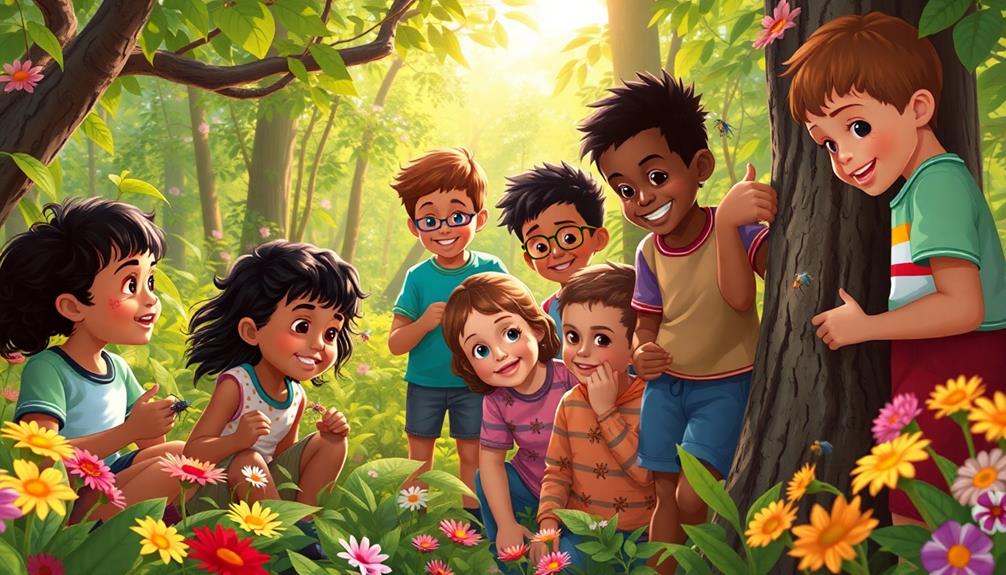
Curiosity brings a host of benefits that can transform both personal and professional experiences. When you foster curiosity in an educational setting, you enhance student engagement, leading to improved academic performance and a deeper understanding of complex concepts.
Research shows that learning driven by curiosity results in better information retention, as knowledge acquired through personal interest is more accessible and enduring. This curiosity can also enhance digital creativity, allowing learners to explore innovative solutions and engage more deeply with their projects.
A curious mindset not only boosts your understanding but also supports the development of critical thinking skills. By encouraging you to ask probing questions and seek diverse perspectives, curiosity helps you analyze issues more deeply.
Additionally, it acts as a debiasing tool, enabling you to recognize and mitigate cognitive biases, which promotes more objective decision-making.
In a professional context, cultivating curiosity within teams and organizations drives innovation and creativity. Engaged employees, fueled by curiosity, are more likely to contribute unique ideas and solutions, giving your organization a competitive edge.
Ultimately, nurturing curiosity can enhance both your personal growth and your effectiveness in the workplace, making it an essential skill for success in today's fast-paced world.
Strategies to Enhance Critical Thinking
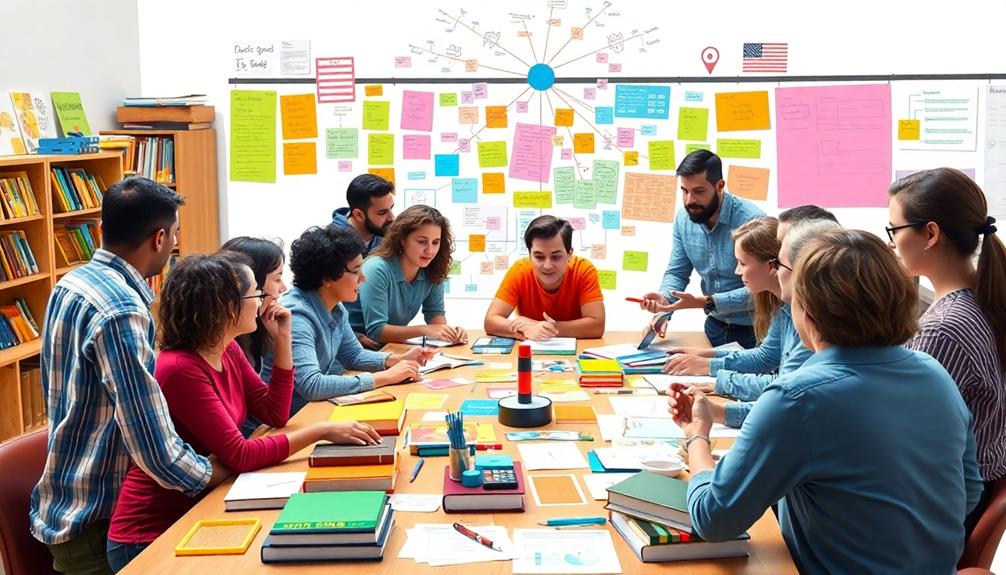
Encouraging critical thinking requires intentional strategies that engage learners and stimulate their analytical skills. One effective approach is Inquiry-Based Learning, where you actively explore topics by asking questions and seeking answers independently. This method fosters a deeper connection with the material and enhances your critical thinking abilities.
Additionally, incorporating techniques from mental health practices can improve focus and clarity, which are essential for effective critical thinking.
Incorporating open-ended questions into discussions can also promote a culture of inquiry. By asking questions that don't have a straightforward answer, you stimulate deeper exploration and encourage meaningful dialogue. Reflective practices are another key strategy; take time to think about your thinking. Analyzing your thought processes can greatly improve your decision-making skills.
Additionally, engaging in collaborative discussions with peers allows you to evaluate different viewpoints critically. This dialogue encourages you to challenge assumptions and consider alternative perspectives.
Overcoming Cognitive Biases

Recognizing and addressing cognitive biases is essential for enhancing your critical thinking skills. Cognitive biases, like confirmation bias and motivated reasoning, can distort your thinking and limit your ability to evaluate evidence objectively. When you favor information that supports your existing beliefs, you miss out on diverse perspectives and informed decision-making.
To overcome these biases, foster genuine curiosity. Curiosity encourages you to explore beyond your partisan interests and question your assumptions. Actively seek out diverse sources of information and engage in discussions that challenge your viewpoints. This practice not only broadens your understanding but also helps you develop a more balanced perspective on complex issues.
Awareness of cognitive biases plays an important role in enhancing your critical thinking skills. By recognizing these biases, you can better engage with alternative perspectives and make more informed choices.
Cultivating a Curious Mindset
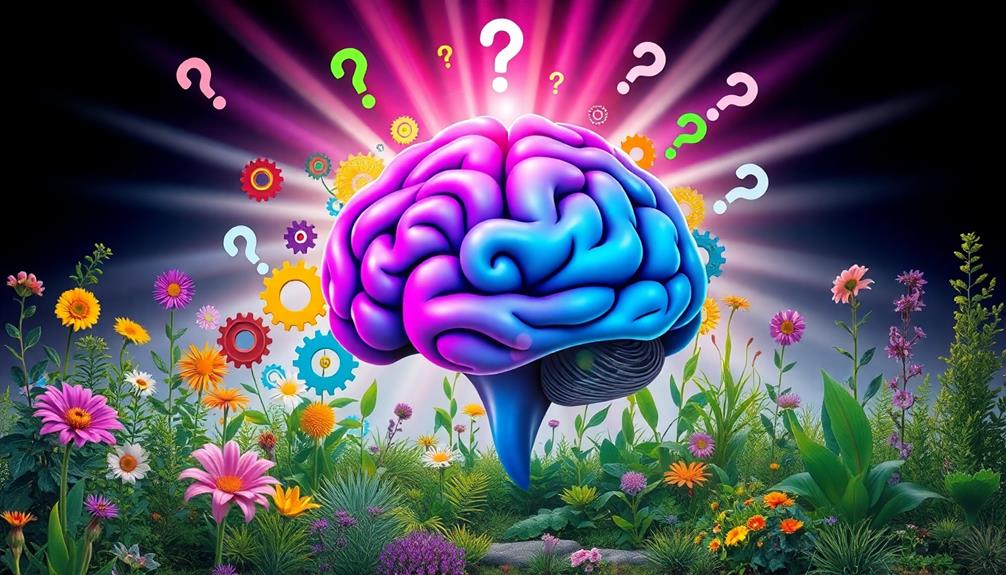
To cultivate a curious mindset, you need to embrace learning environments that spark your interest and encourage exploration.
Asking open-ended questions can help you uncover new ideas and perspectives, leading to richer insights.
Curiosity-Driven Learning Environments
When students feel safe to ask open-ended questions, curiosity-driven learning environments thrive, fostering a mindset that embraces exploration and inquiry.
These environments not only stimulate curiosity but also enhance critical thinking skills, leading to better academic outcomes.
Here are four key elements that contribute to such an environment:
- Safe Space for Inquiry: Create a classroom culture where students can express their thoughts without fear of judgment, encouraging them to take risks.
- Real-World Problems: Integrate real-life challenges into lessons, motivating students to seek innovative solutions that relate to their interests.
- Interactive Technology: Utilize diverse resources and platforms, enabling students to engage with various perspectives and deepen their understanding.
- Encouragement of Open-Ended Questions: Foster an atmosphere where asking questions is celebrated, leading to deeper exploration of complex topics.
Encouraging Open-Ended Questions
Encouraging open-ended questions sparks a curious mindset and paves the way for deeper learning. When you ask questions that don't have straightforward answers, you stimulate deeper thinking and exploration. This approach prompts you to go beyond surface-level responses and engage with complex topics.
Research shows that students who embrace open-ended questions demonstrate higher levels of curiosity and critical thinking skills compared to those who stick to closed questions.
By fostering a culture that values open-ended inquiry, you can enhance your problem-solving abilities and promote a more engaged learning environment. Open-ended questions encourage you to articulate your thoughts and reasoning, leading to improved understanding and retention of information.
This habit not only enhances your critical thinking but also encourages collaboration and sharing diverse perspectives among your peers.
Make it a point to regularly incorporate open-ended questions into your discussions. Challenge yourself and others to think critically and explore various possibilities.
As you cultivate this practice, you'll find that your curiosity expands, and your ability to analyze and synthesize information will grow markedly, setting the stage for lifelong learning.
Exploring Diverse Perspectives
Exploring diverse perspectives is a powerful way to cultivate a curious mindset and enhance critical thinking skills. By engaging with various viewpoints, you challenge your existing beliefs and open yourself to new information, which leads to a more thorough understanding of issues.
Here are four benefits of embracing diverse perspectives:
- Enhanced Curiosity: You'll find yourself asking more questions about different cultural and social contexts.
- Innovative Problem-Solving: Exposure to a variety of viewpoints fosters creative thinking, enabling you to generate unique solutions to complex challenges.
- Empathy Development: Active listening to contrasting opinions helps you cultivate empathy, which is essential for effective collaboration and communication.
- Mitigating Cognitive Biases: By consistently considering diverse perspectives, you can reduce cognitive biases like confirmation bias, thereby strengthening your critical thinking capabilities.
Incorporating diverse perspectives into your thought process not only enriches your understanding but also makes you a more effective thinker.
Frequently Asked Questions
How Does Curiosity Relate to Critical Thinking?
Curiosity fuels your desire to learn and understand more about the world. When you ask questions and seek answers, you engage in deeper thinking.
This process sharpens your ability to analyze information and solve problems effectively. By challenging your assumptions and considering different viewpoints, curiosity helps you think critically.
Essentially, when you nurture your curiosity, you enhance your critical thinking skills, enabling you to tackle complex issues with confidence and creativity.
What Is the Difference Between Curiosity and Critical Mindedness?
Curiosity and critical mindedness create contrasting yet complementary qualities.
Curiosity's enchanting call compels you to explore, ask questions, and seek knowledge without immediate analysis. In contrast, critical mindedness demands deliberate discernment, urging you to evaluate evidence, assess arguments, and avoid biases.
While curiosity ignites your interest, critical mindedness hones your judgment. Together, they form a powerful partnership, enhancing your understanding and decision-making skills in a complex world.
Why Is Intellectual Curiosity an Integral Component of Critical Thinking?
Intellectual curiosity's an integral component of critical thinking because it drives you to ask questions and seek deeper understanding.
When you're curious, you engage more actively with information, improving retention and comprehension. This mindset helps you recognize cognitive biases, enabling clearer judgment.
By exploring diverse perspectives, you cultivate open-mindedness, which is essential for evaluating complex issues.
Ultimately, curiosity not only enhances your knowledge but also sharpens your analytical skills, leading to better decision-making.
What Does Critical Thinking and Curiosity Are the Key to Creativity Mean?
When you think about creativity, critical thinking and curiosity are essential. Critical thinking helps you analyze and evaluate ideas, while curiosity drives you to explore new concepts and perspectives.
Together, they enable you to challenge assumptions and think outside the box. By embracing curiosity, you spark innovative thoughts and solutions, allowing your creativity to flourish.
Conclusion
In your quest for knowledge, you'll find that curiosity and critical thinking often dance hand in hand. Just when you think you've unraveled a mystery, a new question sparks your interest, pushing you to think deeper. Embracing this synergy not only sharpens your mind but also opens doors to unexpected insights. So, next time you stumble upon a puzzling idea, lean into your curiosity—it might just lead you to the answers you didn't know you were seeking.
